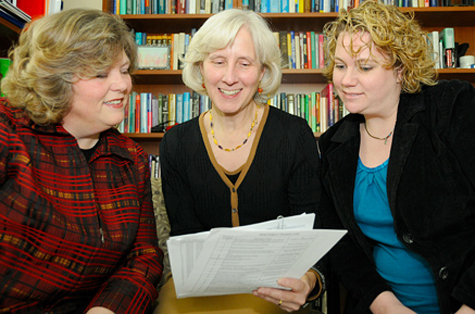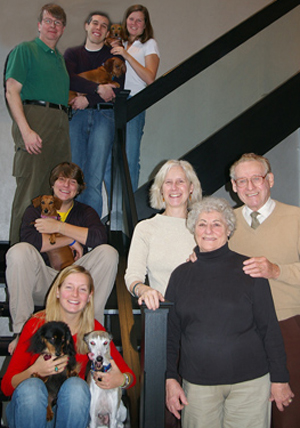
Things don’t always turn out the way we plan. In fact, sometimes there isn’t really much of a plan at all. Serendipity is a word that Kathleen K. Bucholz, Ph.D., uses a lot as she describes her career path. She didn’t really start out to be a psychiatric epidemiologist or to study how genes and environment intersect to contribute to problems with alcohol. In fact, for much of college, science was an afterthought.
A voracious reader who grew up steeped in colonial Connecticut lore, Bucholz, professor of epidemiology in psychiatry and scientific co-director of the university’s Midwest Alcoholism Research Center, earned an undergraduate degree in American studies from Yale College. She says she chose her major because she had always loved English and history.
“I must confess, my career path wasn’t entirely planned,” she says. “I took very little science. I took the course they called ‘rocks for jocks,’ but I did reasonably well in math, and after graduation, I kind of fell into public health.”
Bucholz wasn’t quite ready to leave New Haven, Conn., upon graduation. Her boyfriend, who later became her husband, had another year left in school. So she took a temporary position at Yale’s medical history library. Then when her boyfriend, Richard, decided to stay at Yale for medical school, Bucholz stayed, too, making her way to the School of Public Health.
“It was more analytical than I thought I would enjoy,” she says, “but actually, it turned out to be a pretty good match for me.”
She earned a master’s degree in public health and began thinking she might someday work in hospital administration. But an internship at Hartford Hospital changed her mind.
“At that time, most of the women in hospital administration were nurses,” she says. “My mother is a nurse, but I didn’t come from that background. So although I could analyze a situation and develop a course of action, actually ‘selling’ people in the hospital on my ideas was a completely different thing, and it was difficult for me in that climate.”
Her adviser finally convinced her to come back to the public health school for a doctorate.
From hospital administration to psychiatric epidemiology
But before she was finished, her husband completed his neurosurgery training and accepted a faculty position at Saint Louis University. Having passed her comprehensive exams, Bucholz was getting ready to write a dissertation when, suddenly, she was a long-distance doctoral candidate, and working on her dissertation from St. Louis wasn’t going to be easy.
It was 1984. She had a child, which made it difficult to travel back and forth to New Haven. And there was no Internet. Relying on phone conversations and old-fashioned letters in the mail, her dissertation committee told Bucholz that the data she was planning to use didn’t meet their expectations.
That’s when she met Lee Robins, Ph.D., then a professor of social science in psychiatry.
“I was working with issues involving economics and health care, and I met with Lee Benham (Ph.D.), who is an economics professor here at Washington U.,” Bucholz says. “He told me about Lee Robins and that she had just received a grant from the National Institute of Mental Health and was looking for people to fill training slots. And so, having zero knowledge — actually correct that, I’d read one paper about psychiatric epidemiology in my graduate work, and I knew the name Lee Robins because she had written it — I met with her, and that was how I got started on what turned out to be my true career path.”
Robins, who passed away in September 2009, was gathering data for the Epidemiologic Catchment Area (ECA) study to learn about the prevalence of psychiatric illness in the general population. Bucholz spent the first year reading as much as she could to get up to speed on psychiatry and psychiatric diagnosis and the incidence and prevalence of psychiatric disorders.
After she caught up, she just kept going, according to colleague Elliot C. Nelson, M.D., associate professor of psychiatry. He says Bucholz now is a leader in that field she once knew so little about.
“Dr. Bucholz has played a major role in the development of several of the most widely used diagnostic assessments in current psychiatric research,” he says. “She is also a devoted and successful mentor with a diverse group of past and present trainees ranging from high-school students to faculty members, and she’s a highly committed collaborator who plays an important role in most of the genetic and genetic epidemiology research conducted in our department.”

During those first days, she fed data into mainframe computers at night and learned about psychiatric epidemiology during the day. She spent time becoming familiar with psychiatry’s Diagnostic and Statistical Manual. She also learned about classification of mental illness in the World Health Organization’s International Classification of Diseases and Composite International Diagnostic Interview. Eventually, she wrote her dissertation about data from the ECA study.
“It was completely serendipitous that I was able to train and to learn from scratch the ins and outs of psychiatric epidemiology and then to work with data, actually developing an expertise with hands-on data. I couldn’t have planned it better,” Bucholz says. “I was very fortunate, and Lee was a great guide.”
That early work mostly involved depression and focused on what motivated depressed people to seek treatment, but soon, Robins suggested to Bucholz that she might want to focus on alcohol use and problems, working with John Helzer, M.D., then a professor of psychiatry, now at the University of Vermont College of Medicine. That new focus pointed her toward the family studies on alcoholism conducted by C. Robert Cloninger, M.D., the Wallace Renard Professor of Psychiatry, and the late Theodore Reich, M.D., then the Samuel and Mae S. Ludwig Chair in Psychiatry.
When Reich received funding for the Collaborative Study of the Genetics of Alcoholism (COGA), he asked Bucholz to participate. And working on COGA introduced her to Andrew C. Heath, D.Phil., the Spencer T. Olin Professor of Psychology in Psychiatry and director of the Midwest Alcoholism Research Center.
“I first got to know Kathy as a scientist and colleague more than 20 years ago, and I’ve been consistently impressed by both the quality and the integrity of her scientific research,” Heath says. “She’s an exemplary colleague, always finding time to be supportive and to give helpful guidance while maintaining her own challenging scientific career studying high-risk alcoholic families and their children.”
Ten years of Guze
In addition to research, Bucholz spends some time each year organizing the annual Guze Symposium on Alcoholism. The event focuses on a particular topic in the field of alcohol and substance dependence. The symposium draws experts from around the United States and has become something of a “state-of-the-science” update in the areas of substance use, genetics and treatments.
It also is designed to provide outreach and education to clinicians who work with alcoholics and others with substance-use disorders. In fact, this year’s symposium, on Feb. 18, is structured in such a way that the presentations relevant to treatment all will take place after lunch.
“That way, clinicians who might not be able to give up a full day to attend at least may be able to make it for half a day,” Bucholz says. “If they come for the afternoon, they’ll hear less about basic scientific discoveries and more about treatment strategies.”
The empty nest
Between all of those research and administrative duties, Bucholz and her husband, Richard, M.D., also managed to raise three children. But these days, their house usually is empty, save the dogs. One daughter lives in North Carolina, another is in medical school in Chicago, and a son is in college in Tennessee. For Bucholz, that has led to almost as many changes as her long-ago change from hospital administration to psychiatric epidemiology.
“There’s almost a 10-year difference between our oldest and our youngest,” she says. “So each time we said ‘goodbye’ to a child, we still had someone at home, but when our son finally left for college, it was a strange transition for us.”
But she’s staying busy. She still reads as much as she can, works out with a trainer twice a week, and she skis.
“I don’t ski well, but I do ski,” Bucholz says. “And we have a place in Park City, Utah, which is where we go to spend Christmas with the family and also to spend a couple of weeks each summer. All the kids come. I’ve even got a 1-year-old grandson. He’s a bit too young for skiing, but we’re looking forward to getting him on the slopes with us. Maybe next year.”
That’s the plan at the moment, anyway. But plans are always subject to change.
Fast facts about Kathleen K. Bucholz
Born: Oct. 6, 1950, in Pawtucket, R.I.
Degrees: B.A., American studies, 1972, Yale College; M.P.H., hospital administration, 1976, and Ph.D., epidemiology, 1986, Yale University; M.P.E., psychiatric epidemiology, 1990, Washington University School of Medicine
Title: Professor of epidemiology in psychiatry
Family: Husband, Richard Bucholz, M.D.; daughters Libby, 29, Ph.D. in biomedical engineering, and Elly, 23, a second-year medical student at Loyola University in Chicago; son, Ethan, 20, a junior at Sewanee: The University of the South; grandson, Clayton Rasch, 1, whose parents, Libby and David, live in North Carolina but who is named after the town in which both of them grew up; and parents Thomas Keenan, 88, a former high-school educator, and Bertha Keenan, 88, a former nurse